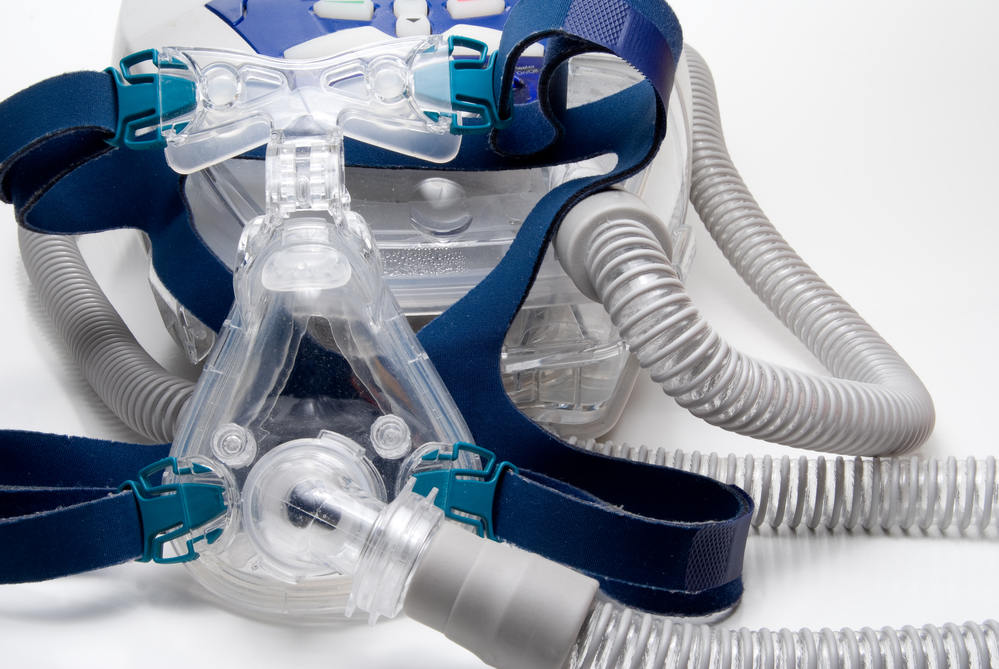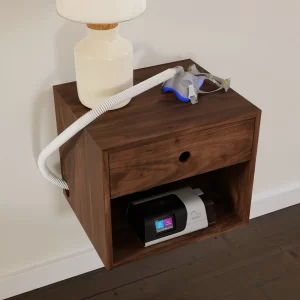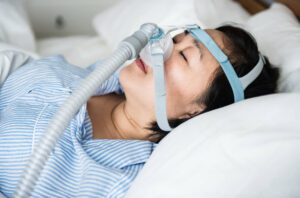Are you looking for the best way to keep your CPAP machine clean? Maintaining your CPAP machine is essential to ensure that it works correctly and safely.
Cleaning a CPAP machine is not difficult, but it can be time consuming and require more attention than you might think. In this article, we’ll provide an easy-to-follow guide to cleaning your CPAP machine so that you can feel confident in its performance.
CPAP machines are used to help people with sleep apnea breathe more easily during the night. They use air pressure to keep the airways open, allowing for easier breathing.
However, if the CPAP machine isn’t maintained properly, it can become a breeding ground for bacteria and other microorganisms.
This can lead to health problems such as sore throats and respiratory infections. Taking the time to clean your CPAP machine regularly will help keep you healthy and comfortable while using it.
In this article, we’ll cover everything from how often you should clean your CPAP machine, what supplies you need, and step-by-step instructions for cleaning it properly.
We’ll also provide tips on troubleshooting common issues that may arise when cleaning your CPAP machine. With this information in hand, you’ll be able to keep your CPAP machine running like new for years to come!
CPAP Cleaning Supplies
Cleaning a CPAP machine properly is essential for health and hygiene. To do this, you’ll need some special supplies. These include CPAP cleaning wipes, CPAP mask wipes, and a CPAP cleaning solution. CPAP cleaning wipes are pre-moistened cloths that will quickly remove dirt, oils and other particles from the exterior of the machine.
They can also be used to clean the air filter if needed. CPAP mask wipes are specifically designed to help clean your mask without causing any damage. Lastly, a CPAP cleaning solution is necessary to completely sanitize your machine and ensure it’s free from germs and bacteria.
Make sure to read the instructions on the bottle before using it as incorrect usage can lead to damage of your device. All these supplies can be found at most medical stores or online retailers. Taking care of them ensures that your CPAP machine remains in good condition for years to come.
CPAP Cleaning Steps
Cleaning a CPAP machine is an important part of its care and maintenance. To ensure the machine is providing the best air quality, it’s important to regularly clean it. Here are some steps to help you clean your CPAP machine correctly:
First, you’ll need to gather the necessary cleaning supplies. This includes a mild soapy solution, distilled water, and vinegar or lemon juice. You’ll also need a soft cloth and cleaning brush, such as an old toothbrush.
Next, disassemble the mask, headgear straps, and other components of the machine. Place them in a sink with warm water and mild soap solution for 10-15 minutes. Afterwards, use the soft cloth with warm water to scrub all surfaces before rinsing them off. If needed, use a small amount of vinegar or lemon juice for any tough stains or buildup.
Lastly, dry off all components with a towel before reassembling the CPAP machine. Make sure everything is dry before putting it back together; this will help prevent mold from forming on any damp surfaces.
What Is The Safest Way To Clean A CPAP Machine?
When it comes to CPAP cleaning, safety should always be a priority. Cleaning a CPAP machine with the wrong products or techniques could result in damage to the device. To ensure that you are using the safest methods possible, there are several steps you should take.
First, always use distilled water when filling your humidifier chamber. Tap water can contain minerals that can build up over time and cause damage to the machine. Distilled water also does not contain bacteria or other contaminants that could be harmful if released into the air.
It is also important to use an appropriate cleaner for your device. Many CPAP machines come with their own cleaning solutions and brushes, but you may also want to use a mild soap and warm water if necessary. Be sure to avoid abrasive cleaners or anything containing bleach or ammonia as these can corrode certain parts of the machine and reduce its effectiveness. Additionally, never submerge any part of the CPAP machine in water as this could cause electrical damage.
Finally, make sure to dry any parts thoroughly after cleaning them so there is no residual moisture left behind which could encourage the growth of mold or bacteria. Make sure all components are completely dry before reassembling the device and turning it on again. With proper care and cleaning, your CPAP machine will continue providing you with clean air for many years to come.
What Are The Symptoms Of A Dirty CPAP Machine?
Symptoms of a dirty CPAP machine can often be hard to detect, as they may not be easily seen or felt. Some of the most common signs that your machine could be in need of cleaning include a build-up of dust and debris on the filter, tubing, or mask, difficulty breathing during use, dryness or irritation of the nose and throat, a buildup of mold or mildew in the tubing, and a musty odor coming from the machine.
If you notice any of these symptoms it is important to take action quickly and clean your CPAP machine.
It is also important to regularly inspect your CPAP equipment for signs of wear and tear such as tears in the mask fabric, cracks in the plastic tubing, or loose connections between pieces. Taking regular care and maintenance will ensure your CPAP machine is running optimally and efficiently so you can get maximum benefit from its use.
Regularly cleaning your CPAP equipment should help maintain its longevity and performance. This is especially important if you are using it every day to treat sleep apnea. A well-maintained CPAP machine can provide years of reliable service while helping you breathe easier at night.
Can I Run Vinegar Through My CPAP Machine?
Now that we’ve discussed the symptoms of a dirty CPAP machine, let’s move on to what you can do to clean it. One way to clean your CPAP machine is to run vinegar through it. This method will help get rid of germs and bacteria that are present in the water chamber and hose.
Before running vinegar through your CPAP machine, make sure to thoroughly read the instructions for your specific model. This is important because different models may have different cleaning protocols. Once you’ve read the instructions, be sure to follow them carefully as running vinegar through your CPAP machine incorrectly could damage it.
If you choose to use vinegar as part of your cleaning routine, mix one cup of white vinegar with four cups of water. Most models suggest that you run this mixture through the water chamber and hose for 15 minutes before draining and rinsing with warm water several times. This should help keep your CPAP machine clean and free from germs and bacteria.
Do I Need To Clean The Inside Of My CPAP Machine?
Yes, you need to clean the inside of your CPAP machine. The components that make up a CPAP machine are delicate and must be carefully cared for to ensure the longevity of the device. This means cleaning not just the outside of the machine but also the internal pieces.
It is important to regularly clean your CPAP machine’s water chamber, tubing, humidifier, and mask. To do this, start by unplugging the device and removing all parts that come in contact with air or water. Most CPAP machines come with cleaning instructions in their user manuals. In addition, many CPAP companies offer special cleaning kits that contain everything you need to keep your device sanitary.
Once you have all the supplies needed for cleaning, it’s time to begin. Start by wiping down the exterior of your CPAP machine with a damp cloth or a disinfecting wipe. Then rinse off any parts that come into contact with air or water with warm soapy water before drying them off with a soft cloth. Once finished, reassemble all of your CPAP components and plug it back in for use again. Taking these steps will help ensure your CPAP machine remains safe and efficient for years to come.
How Often Should I Clean My CPAP Machine?
Cleaning your CPAP machine is an important part of maintaining it and ensuring it continues to work properly. It’s recommended that you clean your CPAP machine at least once a week. This includes cleaning the mask, tubing, and water chamber. If you use a humidifier, make sure to also clean the chamber and replace the water as needed.
You may need to clean your CPAP machine more often if there is any buildup of dirt or bacteria in the mask or tubing. It’s a good idea to inspect the mask and tubing each day for any signs of dirt or debris, and then clean them as necessary. Additionally, always be sure to use distilled water in the humidifier chamber when filling it so that no mineral deposits form on the device.
It’s also important to disinfect your CPAP machine on a regular basis. You can do this by wiping down all surfaces with a damp cloth soaked in mild detergent and warm water every couple of weeks or so. Make sure to let all parts air dry before reassembling your equipment for use. Regularly cleaning and disinfecting your CPAP machine will help keep it functioning properly for years to come.
Can I Use Alcohol Wipes To Clean My CPAP?
Having answered the question of how often to clean a CPAP machine, it is important to consider what materials can be used for cleaning. Many people wonder if alcohol wipes can be used for cleaning their CPAP machine. The answer is yes, but it is essential to use them correctly to avoid damaging your equipment.
Alcohol wipes are effective for cleaning and sanitizing surfaces, including CPAP machines. It’s important to read the manufacturer’s instructions carefully before using them. Alcohol wipes should never come into contact with any electronic components or tubing, as these could be damaged by the alcohol in the wipe. Instead, only use alcohol wipes on areas such as the mask cushion, headgear straps, and other surfaces that don’t contain any electrical components.
It’s also important to note that while alcohol wipes do help keep your CPAP equipment clean and sanitized, they should not be used as a replacement for regular deep-cleaning sessions. You should still follow the manufacturer’s directions on how often to clean your CPAP machine in order to get optimal results and protect your health.
Do I Need To Change The Water In My CPAP Daily?
It’s important to change the water in your CPAP machine every day. This will help keep it functioning properly and prevent any bacteria or mold from growing inside. If you don’t change the water daily, you run the risk of breathing in contaminated air.
The best way to clean the water chamber is to empty it out each night and give it a quick rinse with distilled water before refilling it. Make sure to let the chamber dry completely before putting it back in the machine. You should also use a new filter once a month to keep your CPAP clean and free of dust and debris.
Cleaning your CPAP regularly will ensure that you get fresh, clean air every time you use it, helping you breathe better during sleep. Taking the time to do this small task can make a big difference in how well your CPAP works for you!
What Happens If You Don’T Clean Your CPAP Regularly?
If you fail to clean your CPAP machine regularly, it can lead to serious health problems. When the CPAP mask and tubing are not properly maintained, they can become a breeding ground for germs, bacteria and mold. These contaminants can be harmful to your health and can cause infections in your lungs, sinuses and throat. In addition, if the filters on the CPAP machine are not cleaned regularly, they will become clogged with dust and other particles which can cause breathing difficulties or an asthma attack.
It is also important to clean the humidifier chamber of your CPAP machine as this is where water is stored for use during therapy. If the chamber is not kept clean it will become a breeding ground for bacteria and fungi which can lead to respiratory issues such as chest colds and bronchitis. Not only that but any buildup of bacteria in the chamber may result in an unpleasant odor being emitted from the device.
Cleaning your CPAP machine on a regular basis is essential in order to maintain good health and to ensure that you get the most benefit out of using it during sleep therapy sessions. It is recommended that you should wash all parts of the CPAP machine at least once every two weeks or more frequently if needed.
Can You Use Lysol Wipes On A Cpap Machine?
Yes, you can use Lysol wipes on a CPAP machine. However, it is important to do so correctly and safely. Before using the wipes, make sure that all detachable parts of the machine are removed and cleaned separately. Then, wipe down all components of the machine with the Lysol wipe being careful not to saturate any part of the machine. Allow each component to fully dry before reassembling the CPAP machine. This will prevent any moisture from entering the internal components which could cause damage or malfunction.
It’s also important to note that certain components should never be wiped down with Lysol wipes such as tubing, cushions or filters. These should be replaced regularly instead of attempting to clean them with a Lysol wipe as they are more delicate than other components and can easily be damaged by these types of cleaning agents. Furthermore, when reassembling your CPAP machine be sure that all parts are securely fastened before use.
Lastly, it is always recommended to consult your healthcare provider before using any kind of cleaning agents on your CPAP machine as they can best advise you on what is safe and effective for your particular model and needs.
Can You Clean CPAP With Vinegar And Baking Soda?
Yes, you can clean your CPAP machine with vinegar and baking soda. Vinegar is a natural disinfectant and baking soda is an effective cleaning agent. Together, these two ingredients create a safe and non-toxic way to clean your CPAP machine.
It’s important to make sure that the vinegar is diluted with water before using it to clean the CPAP machine. You should mix one part vinegar with three parts water in a bowl or spray bottle. Once the solution is made, you can either dip a cloth into it or spray it onto the outside of the CPAP machine. Be sure to avoid getting any of the solution near the vents or other electrical components.
Gently wipe down the outside of the CPAP machine, including all surfaces and crevices. Allow it time to air dry before plugging it back in and using it again. This method of cleaning is safe for all types of CPAP machines and is an easy way to keep them in good condition so they can work properly for years to come.
Conclusion
In conclusion, cleaning your CPAP machine regularly is essential to ensuring its performance and your health. The supplies needed for cleaning are simple and the steps easy to follow. Knowing the safest way to clean a CPAP machine, being aware of the symptoms of a dirty one and understanding when you need to change the water in your CPAP are all important considerations.
It’s also useful to know that vinegar and baking soda can be used as an alternative cleaner, as well as Lysol wipes if you prefer. However, it’s important not to get too rough when cleaning your CPAP machine so you don’t damage any components.
Finally, it’s worth noting that failing to clean your CPAP on a regular basis could cause serious health issues in the long run, so make sure you’re taking care of yours properly – I know I will be!




